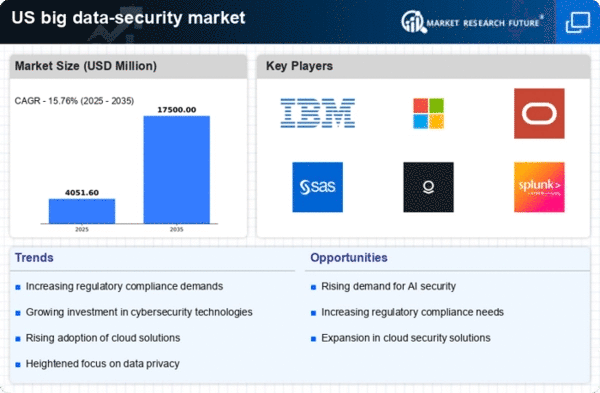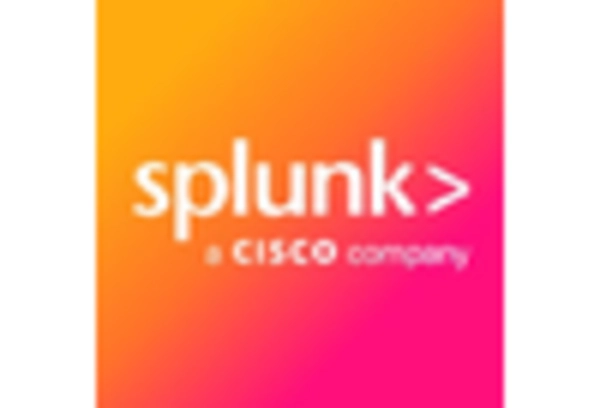Rising Cyber Threats
The increasing frequency and sophistication of cyber threats is a primary driver for the big data-security market. Organizations across various sectors are experiencing a surge in data breaches, ransomware attacks, and phishing schemes. In 2025, it is estimated that cybercrime will cost businesses globally over $10 trillion annually, highlighting the urgent need for robust security measures. As companies recognize the potential financial and reputational damage from these threats, investments in big data-security solutions are likely to escalate. This trend is particularly pronounced in the financial services and healthcare sectors, where sensitive data is at risk. Consequently, the big data-security market is expected to grow as organizations seek to protect their assets and maintain customer trust.
Evolving Regulatory Landscape
The evolving regulatory landscape in the US is significantly influencing the big data-security market. With regulations such as the California Consumer Privacy Act (CCPA) and the Health Insurance Portability and Accountability Act (HIPAA), organizations are compelled to enhance their data protection strategies. Compliance with these regulations often requires substantial investments in security technologies and practices. As of 2025, it is projected that compliance-related expenditures will account for approximately 30% of total IT security budgets. This regulatory pressure not only drives demand for big data-security solutions but also encourages organizations to adopt proactive measures to avoid hefty fines and legal repercussions. Thus, the big data-security market is poised for growth as businesses strive to meet these stringent requirements.
Growing Awareness of Data Privacy
The growing awareness of data privacy among consumers and businesses is a pivotal driver for the big data-security market. As individuals become more conscious of how their data is collected, stored, and used, they demand greater transparency and security from organizations. This shift in consumer expectations is prompting businesses to prioritize data protection strategies. In 2025, surveys indicate that over 80% of consumers are concerned about their data privacy, leading companies to invest in big data-security solutions to enhance their security posture. This heightened awareness not only drives demand for security technologies but also encourages organizations to adopt best practices in data management. Consequently, the big data-security market is likely to experience substantial growth as businesses respond to these evolving consumer expectations.
Shift Towards Cloud-Based Solutions
The shift towards cloud-based solutions is reshaping the big data-security market. As organizations migrate their operations to the cloud, they face new security challenges that require specialized solutions. In 2025, it is anticipated that over 70% of enterprises will have adopted cloud services, creating a pressing need for effective security measures. Cloud environments introduce complexities such as shared responsibility models and multi-tenancy, which can complicate data protection efforts. As a result, businesses are increasingly investing in big data-security solutions tailored for cloud environments. This trend suggests a significant opportunity for growth within the big data-security market as organizations seek to secure their cloud-based assets and ensure compliance with regulatory standards.
Increased Data Volume and Complexity
The exponential growth of data generated by organizations is a critical driver for the big data-security market. As businesses increasingly rely on data analytics for decision-making, the volume and complexity of data continue to rise. In 2025, it is estimated that the total amount of data created will reach 175 zettabytes, necessitating advanced security measures to protect sensitive information. This surge in data volume presents unique challenges for security professionals, as traditional security measures may not suffice. Consequently, organizations are turning to big data-security solutions that can effectively manage and secure vast amounts of data. This trend indicates a robust growth trajectory for the big data-security market as companies seek innovative ways to safeguard their data assets.
.png)
















